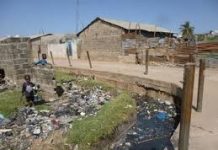By: Kebba AF Touray
The Department of Livestock Services (DLS) under the Ministry of Agriculture in collaboration with various stakeholders, will convene a validation workshop on the Animal Health Bill 2019, in The Gambia.
The three-day convergence is slated to take place from the 15th to 17th of May 2019, and will be supported by African Union and the Inter African Bureau for Animal Resources (AU-IBAR). The event will also attract participants from the public sector, veterinary statutory bodies, livestock owners and traders, civil society and NGOs. The aim of the workshop is to enhance livestock policies and animal health legislation for improved technical capability and increased investment, and to foster public/private partnership and better market access.
Speaking to the Director General at the Department of Livestock ahead of the event, Dr. Abdou ceesay explained that the Diseases and Animal Act 1994, and the Gambia Veterinary Council Act 2000, are outdated and do not address the current realities in the sector.
He said the Performance of Veterinary Services (PVS), GAP Analysis Mission, Veterinary Legislation Support Program (VLSP), the Identification Mission reports, and a Consultant in the person of Hawa Ceesay Sabally’s report, have all revealed gaps in a number of institutional and regulatory areas concerning Veterinary Legislation in the country.
According to Dr. Ceesay, it has been found necessary to work towards updating the above indicated instruments to enable DLS and the Veterinary Services of the Gambia, provide even better services to the livestock sector; that currently, it is known that six out of every ten people with known infectious illnesses acquire this from animals as well as 75% of people with new or emerging infectious illnesses originates from animals; that hence controlling infectious illness in animals will reduce its impact on human health, livelihoods and the environment. Dr. Ceesay further said that the recently conducted livestock census in 2016 revealed that annually, 10.14% of our national cattle population exit from our herds; that about 5.41% or 15,852 heads die due to diseases; that in monetary value, this amounts to GMD 151,881,499.44, or a total loss of 1,902.24 metric tons of meat annually. He said losses in small ruminants like sheep, goats, and poultry including pigs, accounts for 23.37%, 23.87%, 28.36% and 17.03% of the total population, respectively. He said this amount in monetary value is GMD 191,740,351.85 or 2,294.75 metric tons of meat losses. To this end, Dr. Ceesay said the Animals Diseases Act should be replaced to empower Veterinary Services to efficiently carry out their key functions in ensuring public safety and promoting the public good.
According to Dr. Ceesay, these areas need to be addressed for the Gambia to develop its livestock sector.



















